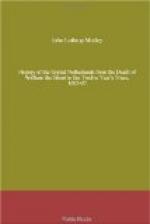But throughout this campaign, the responsibility was entirely, almost ostentatiously, thrown by the States-General upon their commander-in-chief, and, as already indicated, their preparations in the spring and early summer had been entirely inadequate. Should he lose the army with which he had so quietly but completely checked Spinola in all his really important moves during the summer and autumn, he might despair of putting another very soon into the field. That his force in that November week before Groll was numerically far superior to the enemy is certain, but he had lost confidence in his cavalry since their bad behaviour at Mulheim the previous year, and a very large proportion of his infantry was on the sick-list at the moment of Spinola’s approach. “Lest the continual bad weather should entirely consume the army,” he said, “we are resolved, within a day or two after we have removed the sick who are here in great numbers, to break up, unless the enemy should give us occasion to make some attempt upon him.”
Maurice was the servant of a small republic, contending single-handed against an empire still considered the most formidable power in the world. His cue was not necessarily to fight on all occasions; for delay often fights better than an army against a foreign invader. When a battle and a victory were absolutely necessary we have seen the magnificent calmness which at Nieuport secured triumph under the shadow of death. Had he accepted Spinola’s challenge in November, he would probably have defeated him and have taken Groll. He might not, however, have annihilated his adversary, who, even when worsted, would perhaps have effected his escape. The city was of small value to the republic. The principal advantage of a victory would have been increased military renown for himself. Viewed in this light, there is something almost sublime in the phlegmatic and perfectly republican composure with which he disdained laurels, easily enough, as it would stem, to have been acquired, and denied his soldiers the bloodshed and the suffering for which they were clamouring.
And yet, after thoroughly weighing and measuring all these circumstances, it is natural to regret that he did not on that occasion rise upon Spinola and smite him to the earth. The Lord had delivered him into his hands. The chances of his own defeat were small, its probable consequences, should it occur, insignificant. It is hardly conceivable that he could have been so completely overthrown as to allow the Catholic commander to do in November what he had tried all summer in vain to accomplish, cross the Yssel and the Waal, with the dregs of his army, and invade Holland and Zeeland in midwinter, over the prostrate bodies of Maurice and all his forces. On the other hand, that the stadholder would have sent the enemy reeling back to his bogs, with hardly the semblance of an army at his heels, was almost certain: The effect of such a blow upon impending negotiations,




